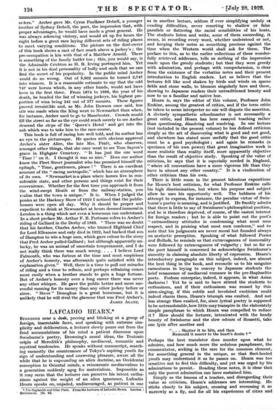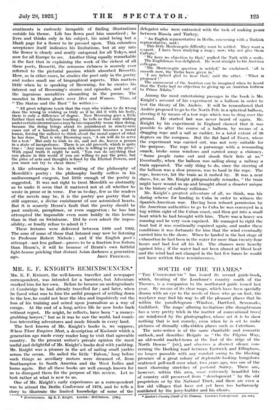LAFCADIO HEARN.*
STANDING near a desk, peering and blinking at a group of foreign, inscrutable faces, and speaking with extreme sim- plicity and deliberation, a lecturer slowly pours out from the fond accumulations of his mind a patient discourse upon Swinburne's poetry, Browning's moral ideas, the Teutonic origin of Meredith's philosophy, mediaeval, romantic and mystical tendencies. He speaks without manuscript, search- ing earnestly the countenance of Tokyo's aspiring youth for sign of understanding and answering pleasure, aware all the while that he is expounding an alien doctrine, an Occidental conception to Oriental minds, a reincarnate mediaevalism to a generation suddenly agog for materialism. Impossible as it may seem that the lecturer can preserve his intent enthu- siasm against the weight of an alien ignorance, Lafcadio Hearn speaks on, unjaded, undiscouraged, as patient in one • Pre-Raphaelite and Other Poets. From the Lectureu of Lafcadio Hearn. London
• Heinemann. Va. ed. . -
as in another lecture, seldom if ever simplifying unduly 01 evading difficulties, never resorting to shallow or false parallels or flattering the racial sensibilities of his hosts. The students listen and write, some of them succeeding, it seems, iii recording every word, whether understood or not, and keeping their notes as something precious against the time when the Western world shall ask for them. The preface to this, as to the earlier collections of these wonder- fully retrieved addresses, tells us nothing of the impression made upon the greedy students ; but that they were greedy with admiration, and perhaps with comprehension, is clear from the existence of the verbatim notes and their present introduction to English readers. Let us believe that the lectures fell like seed shaken by birds and winds on sparse fields and stone walls, to blossom singularly here and there, showing to Japanese readers their untraditioned beauty and now to us a familiar and native hue.
Hearn is, says the editor of this volume, Professor John Erskine, among the greatest of critics, and if the term critic be taken to mean interpreter no one will dispute the assertion. A divinely sympathetic schoolmaster is not necessarily a great critic, and Hearn has here essayed teaching rather than questioning, dissolving and resolving. In one lecture (not included in the present volume) he has defined criticism simply as the art of discovering what is good and not good, and elsewhere has stated more usefully that the good critic must be a good psychologist ; and again he remarks (a specimen of his own power) that great imaginative work is more realistic than reality itself, more apparently objective than the result of objective study. Speaking of the value of criticism, he says that it is especially needed in England, " where all conventions have a more vigorous life than they have in almost any other country." It is a vindication of other criticism than his own.
There is little room in the present laborious expositions for Hearn's best criticism, for what Professor Erskine calls his high discrimination, but where his purpose and subject allow he uses his opportunity well. The boldness of his attempt to express, for instance, the peculiar virtue of Swin- burne's poetry is amazing, and is justified. He frankly admits that there is little to say of Swinburne's philosophical position, and he is therefore deprived, of course, of the easiest interest for foreign readers ; but he is able to point out the poet's extraordinary attitudes in condemning what most men respect, and in praising what most men condemn," and to note that his judgments are never moral but founded always on aesthetic perception. Speaking of what followed Poems and Ballads, he reminds us that extravagances of immorality were followed by extravagances of vulgarity ; but so far as the poet himself is concerned he acknowledges Swinburne's sincerity in claiming absolute liberty of expression. Hearn's introductory paragraphs on this subject, indeed, are almost the best thing in the book, and reconcile us to his sanguine earnestness in trying to convey to Japanese students the brief renascence of mediaeval romance in the pre-Raphaelite poets. Forlorn enterprise, indeed, it appears, in what Asian darkness ! Yet he is said to have stirred the students to enthusiasm, and if their enthusiasm was roused by this siren-singing, if this subtle and involuted exoticism could indeed charm them, Hearn's triumph was exalted. And not less strange than exalted, for, since lyrical poetry is supposed to be untranslatable, how little may transpire in the elaborately simple paraphrase to which Hearn was compelled to reduce it ? How should the lecturer, intoxicated with the heady beauty of Swinburne and the slow odours of Rossetti, take one lyric after another and
" . . Shatter it to bits, and then Remould it nearer to the heart's desire ? "
Perhaps the best translator does murder upon what he admires, and how much more the sedulous paraphraser, the commentator, seeking in the rare for the common element, for something general in the unique, so that fleet-heeled youth may understand it as he passes on. Hearn was too sensitive not to feel this difficulty, and yet was urged by his admirations to persist., Reading these notes, it is clear that only the purest admiration can have sustained him. Simply as the lessons of a teacher, and disregarding their value as criticism, Hearn's addresses are interesting. He sticks closely to his subject, crossing and recrossing it as narrowly as a fly, and for all his experiences of cities and continents is curiously incapable of finding- illustrations outside his theme. •Life has flown past him unnoticed ; he lives and thinks only in his subject, his mind being but a blank page for a flower to be pressed upon. Thiacolourless acceptance itself indicates his limitations, but at any rate the flower is clearly and neatly outspread .for all Tokyo, and now for all Europe to see. Another thing equally remarkable is the fact that in' explaining the work of the richest of all
these poets, Rossetti, the sensuous richness is scarcely. ever referred to the pictorial passion which absorbed Rossetti. Here, as in other cases, he studies the poet only in the,poetry and makes small use of biographical aspects. This matters little when he is speaking of .Browning, for he creates his interest out of Browning's stories and episodes, and out of the ingenious moralities abounding in the poems. The moralist in tlearn gloats over Men and Women. Thus, of " The Statue and the Bust " he writes :--
" All great religions teach. that the man who wishes to do wrong does the wrong in wishing as truly as if he did it with. his body, there is only a difference of degree. Now Browning goes a little further than such religious teaching ; he tells us that only wishing under certain circumstances may be i ncomparably worse than doing, because the doing brings about its punishment in ninety-nine cases out of a hundred, and the punishment becomes a moral lesson, forcing the sufferer to think about the moral aspect-of what he has done. That is why Browning says, A sin will do to serve for a test.' But only to wish to do, and not do,..leaves a person in a state of inexperience. There is an old proverb, which is quite true : Any man can become rich who is willing to pay the price.' With equal truth it might be said, You can do anything that you please in this world if you are willing to pay the price, but the price of acts and thoughts is fixed by the Eternal Powers, and you must not try to cheat them.' "
A like advantage is his in writing of the philosophy of Meredith's poetry : the philosophy hardly suffers in his undiscouraged exegesis, but little enough of the poetry is suggested. It was not right to treat Meredith so abstractly as to make it seem that it mattered not at all whether he wrote in prose or in verse. For us to-day, few as the readers of the novels may be, it is the poetry qua poetry that is still supreme, a divine enrichment of our astonished hearts. But it is scarcely Hearn's fault that the poetry should be past analysis, paraphrase, or even suggestion ; he has but attempted the impossible even more boldly in this lecture than in that on Swinburne. Did he ever admit the impos- sibility, or fondly refuse to admit it ?
These lectures were delivered between 1896 and 1902.
The sons of some of those that listened may now be listening to Professor Robert Nichols ; and if the English poet's attempt—not less gallant—proves to be a fraction less forlorn than Hearn's, it will be because of Hearn's own faithful light-beams pricking that distant Asian darkness a generation







































 Previous page
Previous page